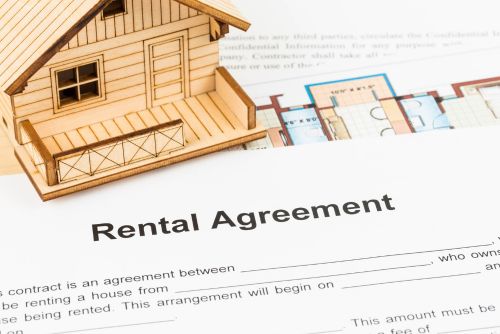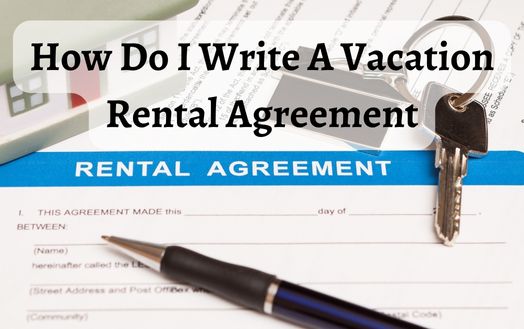How Do I Write A Vacation Rental Agreement
How should you rent your vacation home? Look no further—I’ve got you. In this article, I will give you tips on how do I write a vacation rental agreement that protects you and your guests. Before getting into the details, let me give you an overview.
Airbnb and VRBO have popularized short-term rentals. These platforms help homeowners list their properties and travelers find unique accommodations. A solid rental agreement is necessary because great opportunities come with great responsibilities. It clarifies expectations and prevents future miscommunications.
Grab a coffee, relax, and learn how to write a good vacation rental agreement. After reading this article, you’ll know how to write a contract that protects your property and makes your guests happy. Let’s begin this exciting journey.
Short-Term Rental Overview
Ready to master short-term rentals? Let’s jump in.
A well-written vacation rental agreement is essential for a smooth rental experience. This contract binds the guest and the property owner or manager. It includes rental rates, check-in and check-out procedures, occupancy limits, and property-specific rules.
Vacation rental agreements are short-term leases for rental properties. Clear expectations protect both parties. Whether you’re renting or staying, this agreement can help avoid future issues. Include all property information in your vacation rental agreement. Its location, amenities, and restrictions are included. Make sure to list any fees, such as cleaning or security deposits, that may apply during the guest’s stay.
After covering the basics of short-term rentals and vacation rental agreements, let’s get into how to write an effective agreement that protects both parties. Vacation Rental Basics await.
Vacation Rental Basics

To create an exciting and satisfying vacation rental experience, make sure you understand the basics.
First, a vacation rental agreement protects property owners and guests. This rental agreement outlines both parties’ rights and responsibilities during their stay. A well-written vacation rental agreement lets you set clear rules for guests while maintaining a good relationship.
Vacation rental agreements have several important elements. First, list the property’s address, amenities, and any restrictions. State the rental period and whether it is short-term or long-term. Include payment terms, including any security deposit and how it will be refunded.
Liability clauses in vacation rental agreements protect property owners. These clauses should address guest or visitor damage. If either party needs to terminate the agreement early, cancellation policies and procedures are essential. When writing your vacation rental agreement, check local short-term rental laws. Your contract should address vacation rental restrictions in certain cities.
Understanding the basics of vacation rental agreements can help you and your guests enjoy their stay. We will discuss “rental agreement essentials” in the next section.
Rental Agreement Essentials
Imagine stepping into your cozy vacation rental, surrounded by all the essential amenities and comforts of home. As a property owner, you need a well-drafted vacation rental agreement to protect you and your guests. A vacation rental agreement template can help you create your own customized document. This short-term rental agreement will clarify the rental terms.
The dates of the rental period, including check-in and check-out times, should be clearly stated in your vacation rental agreement. Also include payment terms, such as when deposits are due and whether additional fees apply. Your rental agreement should also include house rules and expectations for guests, such as noise levels, smoking policies, pet restrictions, and other property requirements. By clearly communicating these expectations, you can avoid potential conflicts during their stay.
Last but not least, include liability clauses in your vacation rental agreement. This protects both parties from any damages or accidents that may occur during the rental period and specifies who is responsible for repairs or replacements. Including these essentials in your vacation rental agreement will help you, the property owner, and your guests have a smooth experience. Now let’s talk about how to include specific terms without missing any important details.
Including Terms In Agreement

Include all terms and conditions in your vacation rental agreement to ensure a smooth and enjoyable experience for you and your guests.
A well-written vacation rental agreement protects your rights as a property owner and ensures that your guests understand their responsibilities during their stay. It should clearly state the duration of the stay, rental rates, payment schedule, and any additional fees or charges. Your vacation rental agreement should include more than just property and rate information.
First, limit the number of guests and visitors to prevent overcrowding and unauthorized use.
Second, set expectations for noise, smoking, pets, and parties to ensure a pleasant experience without disturbing neighbors or causing damage.
To guard against guest-caused damage, include a security deposit requirement in your vacation rental agreement. Clearly state the amount of the deposit and explain how it will be returned or forfeited. You should also include liability insurance coverage requirements for both you and your guests. By including these important terms in your vacation rental agreement, you can minimize potential issues, ensure a smooth renting process for both parties, and protect yourself as a property owner.
Creating A Rental Contract
A rental contract helps you and your guests communicate. A vacation rental agreement spells out the property’s terms and conditions and clarifies each party’s rights and responsibilities. With careful consideration and attention to detail, you can create a comprehensive and secure short-term rental contract.
When creating a rental contract, include all necessary information, such as the names of the guests, duration of stay, payment details, house rules, and any additional fees or charges. Be specific about what’s included in the rental property and what’s not allowed to avoid misunderstandings or disputes. Consider including clauses regarding liability insurance or damage deposits to protect yourself as the owner.
A good vacation rental agreement should also cover cancellation policies, maintenance duties, and dispute resolution. Use clear language so guests can understand it. A vacation rental contract clarifies payment terms, house rules, liability issues, and dispute resolution procedures, ensuring a smooth experience for both parties.
Let’s see how a template can streamline this process without sacrificing details.
Using A Template

Use a template designed for your short-term property to save time and create a comprehensive vacation rental agreement. Templates provide pre-set sections and clauses that you can customize to fit your needs. A template saves you time and prevents you from forgetting details.
Using a template for your vacation rental agreement offers several benefits:
- Time-saving: By utilizing a template, you eliminate the need to spend hours researching and drafting every aspect of the contract. The pre-designed sections make it quick and easy to fill in the necessary information.
- Comprehensive coverage: Templates often include all the essential elements required in a rental agreement, such as terms of payment, security deposit details, rules and regulations, cancellation policy, and more. This ensures that no important aspects are overlooked.
- Customizable flexibility: While templates provide a solid foundation for your contract, they also allow room for customization. You can tailor the language, terms, and conditions to reflect the unique requirements of your property.
- Contextually relevant: Templates designed specifically for vacation rentals take into account industry standards and legal considerations applicable to short-term rentals. This means you have access to best practices without having to do extensive research.
By using a well-crafted vacation rental agreement template, you can save time while ensuring all essential aspects are covered in an engaging manner. However, there is still one crucial decision left: whether to choose a lease or a rental agreement. Let’s discuss this in the next section.
Lease Vs. Rental Agreement
As an innovator, you may wonder if a lease or rental agreement is best for your short-term vacation rental.
A rental agreement is best for vacation rentals, while a lease is best for long-term rentals. If you want flexibility with your vacation rental property, a rental agreement is better than a lease because it lets you set specific terms and conditions for each booking without committing to long-term commitments.
Using a rental agreement to manage a short-term vacation rental has several benefits. First, it allows you to customize the terms of each booking based on your preferences and current market conditions. You can easily adjust prices or add services depending on demand or special events in your area. Second, having guests sign a rental agreement ensures that they understand their responsibilities during their stay.
After understanding leases versus rental agreements, let’s discuss tenant responsibilities at your vacation rental property.
Tenant Responsibilities

The rental agreement requires tenants to keep the property clean and tidy during their stay, creating a welcoming and comfortable environment for future guests. In this section, I will share how do I write a vacation rental agreement.
Tenants should clean the kitchen, living room, and bathroom regularly to ensure guests have a good stay. Tenants must report any damages or repairs to the landlord or property manager immediately to avoid having their security deposit deducted.
Tenants should also follow the vacation rental agreement’s rules, such as respecting noise levels and being considerate of neighbors, and not engage in any illegal activities on the property. This helps maintain a peaceful atmosphere and good relations with other guests.
Finally, when checking out, tenants must remove all personal belongings, properly dispose of trash, and return any keys or access cards as per the rental agreement.
In the next section, “rent payment details,” we must clarify landlord and tenant rent payment responsibilities.
Rent Payment Details
Our vacation rental agreement outlines the following rental payment details to ensure a smooth rental experience:
- Payment Schedule: Rent is due on the first day of each month during your stay. It’s essential to make these payments on time to avoid any complications or late fees. We offer flexible payment options such as online transfers, credit card payments, or personal checks.
- Security Deposit: Before your arrival, we require a security deposit that acts as a safeguard against any damages or excessive cleaning required after your departure. This deposit will be collected separately from the rent and will be refunded within 14 days of your check-out, provided there are no damages.
- Late Payment Policy: If you’re unable to make your rent payment by the due date, please notify us immediately so that we can work out an alternative arrangement. Late payments may incur additional charges or penalties as specified in our rental agreement.
We believe that clear communication and understanding regarding rent and other financial aspects are crucial for an enjoyable vacation rental experience. Now that you know how to handle rent payments smoothly, let’s focus on maintaining the rental property without compromising its innovative features.
Ensuring Rental Maintenance

Maintaining your rental property’s innovative features and creating a seamless vacation experience require defining rental maintenance responsibilities and expectations in the vacation rental agreement.
Regular inspections, prompt repairs, and clear communication channels for guest issues make a well-maintained short-term rental more appealing and reduce the risk of property damage.
Regular inspections before and after each guest’s stay allow you to identify any potential issues, such as leaks, faulty appliances, or damages, and quickly repair or replace them to keep your rental property in top condition for future guests. A well-maintained rental property leaves a positive impression on guests and encourages them to treat your space with respect throughout their stay. Establishing open lines of communication with your guests is crucial to resolving any maintenance issues they may have.
Including clear maintenance guidelines in the vacation rental agreement protects both parties. It informs guests of their responsibilities to keep the property clean and report any damages, and it requires hosts to promptly address guest maintenance concerns.
By ensuring proper rental maintenance through regular inspections, effective communication channels, and clear guidelines in the vacation rental agreement, you foster innovation and an exceptional vacation experience for all guests. Now let’s explore some valuable tips to consider when drafting your vacation rental contract to further enhance this seamless experience without missing important details or steps.
Vacation Rental Contract Tips
By including payment schedules, cancellation policies, and house rules in your vacation rental agreement, you can ensure a smooth and enjoyable stay for your guests.
In your vacation rental agreement, clearly state the rental period, including check-in and check-out times, and any additional fees, such as cleaning or pet fees. Also, specify the security deposit and how it will be handled in the event of damages or excessive cleaning.
To protect yourself as the vacation home owner, consider including liability clauses, such as disclaimers for injuries or accidents that occur on the property during their stay. Also, clearly state any restrictions on activities or amenities.
Finally, a well-drafted vacation rental agreement should be fair and balanced for both parties. While you want to protect your investment and ensure proper care of your property, it’s equally important to provide transparency and clear expectations for your guests. By creating an open line of communication through this contract, you can build trust with your renters and avoid disputes.
After covering some essential tips for creating a comprehensive vacation rental agreement, let’s talk about protecting your rental property without compromising guest satisfaction.
Protecting Your Rental Property

Protecting your rental property is a top priority when writing a vacation rental agreement. By including clauses about security deposits, house rules, and property maintenance, you can set clear expectations for both parties.
A detailed description of how the property should be maintained during the guests’ stay should be included in your vacation rental agreement. This can include cleaning responsibilities, trash disposal, and restrictions on activities or behaviors that could cause damage.
Establishing security deposit procedures is another important part of protecting your rental property. These deposits act as insurance against potential damages caused by the rental party during their stay. Your agreement should state how much the deposit will be, when it will be returned (if no damages occur), and what circumstances could result in deposit deductions.
Finally, a section on termination of the rental agreement should specify under what circumstances either party can terminate the contract early and what penalties may apply. This protects your interests and ensures that both parties are aware of their rights and responsibilities during their stay. You can build a successful short-term lease by including maintenance expectations, security deposit procedures, and termination clauses in your vacation rental agreement.
Understanding Legal Requirements
After discussing vacation rental agreement property protection, let’s discuss legal requirements.
A vacation rental agreement is a legally binding contract between the property owner and the renter that outlines the terms and conditions of the rental lease, protecting both parties. As a property owner, it’s important to understand these legal requirements to ensure a smooth rental process.
The vacation rental agreement should clearly state under what circumstances termination can occur and any penalties or fees associated with it to avoid future disputes.
As part of your legal requirements, you must include a detailed rental application to gather information about potential renters, such as their contact information, employment history, and references. This helps reduce the risks of renting your property.
After discussing some key legal elements for your vacation rental agreement, let’s move on to understanding the key elements of a rental agreement without writing step.
Key Elements Of A Rental Agreement

To ensure a smooth rental process, you must understand the key elements of a legally binding agreement between you and the renter. Here are three important aspects to consider when drafting your short-term vacation rental agreement:
- Clear and comprehensive terms: Your rental agreement should clearly outline all terms and conditions of the rental, including the duration of stay, check-in and check-out procedures, and any specific rules or restrictions. Be sure to include details such as the rental rate, payment schedule, and security deposit requirements.
- Number of guests: Specify in your agreement the maximum number of guests allowed to stay on the property. This is important for safety reasons and to avoid overcrowding. Additionally, clarify whether additional fees apply for extra guests or if they are strictly prohibited.
- Rental rate adjustments: It’s common for rental rates to vary depending on factors like seasonality or special events happening in the area. Consider including a clause in your agreement that allows for adjustments to the rental rate under these circumstances. Clearly state how this will be communicated with the renter and what notice period is required.
These key elements in your short-term vacation rental agreement can help ensure a transparent and mutually beneficial relationship with your renters.
Using An Agreement Sample
A well-drafted short-term or vacation rental agreement is essential when renting out your vacation rental property. Use an agreement sample to easily create a smooth and mutually beneficial relationship with your renters. You can save time and make sure your vacation rental agreement covers all the essentials by using an agreement sample.
A short-term vacation rental agreement template includes payment terms, cancellation policies, house rules, and liability waivers, saving you hours of research and drafting. An agreement sample also ensures consistency in your rental agreements, which makes it easier for both parties and adds credibility to your business if you own multiple vacation rental properties or rent out your property throughout the year.
In addition to providing structure and convenience, using an agreement sample allows for customization to your specific needs. While the template gives you a strong foundation, you can still modify certain clauses or add additional terms based on your unique situation or preferences. This flexibility ensures that each rental agreement reflects the specific requirements of your vacation rental property while adhering to legal standards.
An agreement sample simplifies the drafting process by providing pre-written sections tailored specifically for short-term rentals. It ensures consistency across all agreements while allowing for customization.
Final Thoughts
In conclusion, a vacation rental agreement protects your property and ensures a smooth rental experience by clearly defining check-in and check-out procedures, payment details, and cancellation policies. Using a sample agreement as a guide can help you create a comprehensive and legally binding contract. Always consider local legal requirements when drafting your rental agreement to avoid future issues.
Now that you already know how do I write a vacation rental agreement, start writing your rental agreement today.
Frequently Asked Questions
How Do I Handle Security Deposits In A Vacation Rental Agreement?
As an innovative host, I prioritize guest safety and satisfaction by handling security deposits in vacation rental agreements. I include a clause in the rental agreement that specifies the security deposit amount and its return terms to build trust and protect my property. This forward-thinking approach gives vacation rental parties peace of mind and a positive experience.
Can I Include Additional Fees In The Rental Agreement?
Yes, you can include additional fees in the rental agreement. It’s important to be upfront about any extra charges during the vacation rental period. This ensures clarity and builds trust with your renters. Common additional fees include cleaning, pet, and amenity fees like pool or parking space fees. The agreement should clearly state these fees to avoid misunderstandings.
Remember, a seamless and innovative experience is key to guest satisfaction and repeat business.
What Happens If The Tenant Cancels Their Reservation?
Your vacation rental agreement should clearly state what happens if a tenant cancels their reservation and any fees or penalties. Depending on the agreement, tenants who cancel within a certain time frame before their arrival date may receive a partial or full refund.
It’s important to clearly communicate these policies to potential tenants so they know the consequences of canceling their reservation. By doing so, you can avoid misunderstandings and disputes.
Is There A Limit To The Number Of Guests Allowed In The Rental Property?
To ensure guest comfort and property safety, the rental property has a guest limit. Limiting the number of guests helps prevent property damage and overcrowding. This way, you can keep your vacation rental high-quality and give your guests a great experience.
How Do I Address Liability And Insurance In The Rental Agreement?
As an innovator, I understand the importance of protecting property owners and guests by including liability and insurance in vacation rental agreements. It’s important to clearly define each party’s responsibilities and hold them accountable for any damages or accidents that may occur during their stay by including clauses that outline guest behavior expectations, activity restrictions, and proper use of amenities. By including these provisions in the rental agreement, we foster trust between owners and guests and encourage responsible enjoyment and innovation in the vacation rental industry.











